While classic style lovers have kept them alive in recent decades, there is no arguing that classic hats are something of a niche accessory in menswear today. Still, many once-ubiquitous brands have managed to maintain a reputation for high quality and are still putting out product today, including Borsalino and Stetson.
During the Golden Age of Menswear, Stetson was widely regarded as the gold standard of American hat making, especially when it came to their Western or cowboy hats; and at that time, they produced more hats than anyone else in the world.
With their Old West imagery and quintessentially American ethos, few brands in menswear held such sway over popular culture of the time. Looking at the world of music, even songs like Stagger Lee or Steely Dan’s “Only A Fool Would Say That” referenced Stetson Hats.
[TAG0]Stetson is an American brand known for their quality hats.
Today, Stetson is one of the few remaining large American brands still known for creating quality fur felt hats, but since the decline of mass hat wearing in the mid-20th century, they’ve had their ups and downs. They’ve had to diversify, and they’ve even changed ownership a number of times.
All of this, then, raises the question that we’ll be answering today: Does Stetson still provide a gold rush of quality hats, or has its time in the spotlight of hat-making set in the West? Before we can fully answer that question, though, or discuss their hat offerings today, we need to understand further how the company came to be.
History of Stetson
[TAG1]Stetson founder: John B. Stetson
Born in 1830, company founder John B. Stetson came from a New Jersey-based family of hat makers. He came up in the business working under his father until John was stricken with tuberculosis. Fearing that he only had a short while longer to live, Stetson wanted to fulfill a lifelong dream and embarked on a journey to see the Old West.
During his journeys, he met a number of drovers, bullwhackers, and buckaroos – which is to say, cow and sheep drivers, ox drivers, and cowboys – and he experienced firsthand all of the different types of hats worn in the Wild West. He took particular notes however of the fact that many of these fur hats, like the coonskin caps that were favored by many of these men, were covered in fleas.
[TAG2]The Stetson Boss of the Plains hat.
Stetson eventually recovered from his illness and upon returning home in the 1860s, he decided he would combine his newfound knowledge, along with his prior hat-making knowledge, to make a hat that would be more practical for men of the West: The Stetson Boss of the Plains hat.
With its extra wide brim and waterproof felt, it protected the wearer’s eyes from the sun and was durable enough to stand up to heavy rain. The style became such a hit that nearly any rancher who could afford one wanted a genuine Stetson cowboy hat. So, it became the definitive quality cowboy hat. (Aside from the old 10-gallon, that is.)
[TAG3]Early prototypes of the hat sold for just five dollars, a fact that is subtly reflected in the Stetson crest.
Production of the hats rapidly expanded when Stetson opened up a factory in Philadelphia. And by the time of John B. Stetson’s death in 1906, the factory grounds employed nearly 5,400 employees and consisted of 25 different buildings.
By the early 1900s then, Stetson had already established itself as an icon within the world of hat making; only really challenged in this respect by its European arch rival, Borsalino. Borsalino, of course, was known for its more urban-styled hats and, fast forwarding just a few decades, you can think of the differences between the two companies as John Wayne and Humphrey Bogart.
[TAG4]The Stetson Fedora model is known as the “Whippet”.
With urbanization and industrialization and not wanting to miss out on this corner of the market, Stetson also came to incorporate more contemporary styles into its wares. One of these was the incredibly popular fedora model, known as the Whippet, and they also produced formal hats like top hats and bowlers as well. Through all this though, the brand did stay true to its Western heritage and kept the cowboy hat craze alive. After all, who hasn’t wished that they could be the Lone Ranger?
But as hat-wearing declined from the mid-1960s onward, Stetson was severely impacted. As the broader hat industry largely collapsed around it, Stetson also fell into financial hardship. They were forced to close their longtime factory in Philadelphia, instead licensing out this Stetson name to other manufacturers in the 1970s.
In the 80s, they expanded their product lines to include not just new hat styles, but also fragrances, eyewear, apparel, and even bourbon.
The Stetson Ethos
[TAG5]Stetson now exudes the Western aesthetic. [Image Credit: Stetson]
Today, the Stetson Company holds the intellectual property and trademark rights to its name, but at least in part, licenses manufacture out to other companies, including RHE Hatco. The company today positions itself as something of a broader lifestyle brand for those who enjoy the Western aesthetic. “Urban Cowboys,” so to speak.
With that said, they do still carry a number of dress hat variants as well, and these are often marketed more toward musicians or hipsters with a jazz-adjacent aesthetic. Like Allen Edmonds, Stetson also markets itself today off of its reputation as a uniquely American brand known for high-quality hats. Many of their hats are still made in America and are typically made from wool, rabbit, or beaver felt. Some of their more fashion-forward models though opt for materials like canvas, leather, or mesh instead.
Stetson Hat Lines
Western
[TAG6]Preston wearing a Stetson Western hat.
Alongside many other high-quality cowboy hats in both felt and straw, Stetson still continues to offer its signature Boss of the Plains hat. Unfortunately, at the time of production of this guide, Stetson was sold out of the Boss of the Plains in my size on their website. So, the cowboy hat I got is a straw model called the Baker 10x.
For those of you who were inspired by Kingsman: The Golden Circle, wearing a Stetson cowboy hat could be an interesting way to blend Western and classic menswear.
Caps & Outdoors
[TAG7]Stetson Flat Caps and Panel Caps.
[TAG8]Stetson’s modern offerings, Trucker Cap and Bucket Hat.
Stetson also now offers more casual caps, including classic styles like flat caps or panel caps, along with more modern offerings like trucker caps and bucket hats.
Stetson also has utilitarian and durable offerings for the great outdoors; with most of the hats in this style being made from wool felt; although some are made from mesh or canvas. While these hats certainly have their place, they are especially purpose-built, designed more for true outdoor excursions like hiking, as opposed to being just for appearances.
Fedora
[TAG9]Fedora-style Stetson hat.
Finally here, Stetson still offers a number of true fedora styles that are in line with classic menswear aesthetics. Most of these are made from genuine rabbit or beaver fur felt. Though, some are made from wool felt as well. Which hat style is going to work best for you will vary not based on just your lifestyle, but also on your head and face shape.
How to Get the Right Hat For Your Face Shape & Body Type
The Whippet
First up here, The Whippet is made with similar proportions to the identically named hat that Stetson first sold from the 1920s through the 50s. It has a ribbon-bound, contrasting edge, and a classically-proportioned brim and crown.
[TAG10]The Whippet
Color-wise, it comes in variations of gray, black, blue, and brown, with the caribou and mink colors being the most popular. Sizing runs from 6 ¾ to 7 3/4, with the wool felt models going for $110 and the rabbit fur felt models going for $235 at the time of this review’s creation.
The hat I’m wearing is a rabbit fur felt Whippet in the popular mink color. My hat size is seven.
The Temple
The Temple is another classic style that takes heavy inspiration from the types of fedoras Stetson was making during the 1940s in particular. This one is perfect to pair with a scotch while ruminating about the femme fatale who got away.
[TAG11]The Temple
It was even worn by Harrison Ford’s Indiana Jones in 1984’s “Temple of Doom,” though it isn’t the quintessential brown hat you’re thinking of.
The Temple has a slightly larger brim and higher crown than the Whippet, and its brim edge is unfinished instead. It comes in the same blacks, browns, and grays that the Whippet does, but also includes some unique colors like light gray and sage.
Sizing runs from 6 ⅞ to 7 7/8, and prices are $100 for wool felt and $230 for fur felt.
The Stratoliner
[TAG12]The Stratoliner
The Stratoliner is a slightly more casual model with a thin ribbon band and a bound brimage. It’s cut with a wider brim with travel in mind as its namesake is the Boeing Stratoliner plane of the mid-20th century. Listening to Frank Sinatra’s album “Come Fly With Me” is recommended while wearing this hat, but not strictly required.
Its silver belly color is perhaps the most iconic, but it also comes in grays, black, brown, and sage. Sizing runs from 6 ⅞ to 7 3/4.
The Stratoliner isn’t available in wool felt, rather, the rabbit felt version goes for $190, and the beaver felt version goes for $450.
The Midtown
[TAG13]The Midtown
Next, the Midtown is an extremely bold and rakish style that has quite a wide brim for a fedora hat. This brim is flat rather than curved and extends a whopping three-and-three-quarters inches out from the crown. Meanwhile, the crown itself is styled in a teardrop shape, and color-wise, it comes in black, brown, and navy.
This hat only comes in wool felt, and rather than using the traditional eighth-of-an-inch increments in sizing, it simply runs on a standard small to extra-large size scale.
Straw Hats
[TAG14]Straw Hats
In addition to felt hats, Stetson also has warm-weather, straw hat offerings – with the Whippet and Stratoliner styles also being made in straw. The Stratoliner, in particular, is made from hemp.
Rather than being made by hand, these hats are machine-made, which is fairly typical for a straw hat at a price point of around $170.
The Ibarra
[TAG15]The Ibarra
If you prefer more of a traditional Panama style, then the Ibarra is more in line with a high-quality summer hat. This one is made from grade 20 Panama straw and has a lightweight quality to it. The weaving is also more in line with higher-end hat models, though at a price of $375, we certainly hope it would be. This model comes in just one color, and sizing runs from 6 ⅞ to 7 5/8.
The Retro Panama
[TAG16]The Retro Panama
Meanwhile, a less expensive model with more traditional styling is fittingly called the Retro Panama. This one comes in grade 3 Panama straw and has a conservative black band. But, this could be switched out for a more colorful band later on if you so desire.
At $95, it has very middle-of-the-road proportions with a two-and-a-half-inch brim and a four-and-a-half-inch crown height. The biggest drawback here is that it again comes in the simple small to extra-large sizing scheme, but it could be a good entry-level hat to consider.
The Open Road
[TAG17]The Open Road
To bring us full circle here, we’ll mention the Open Road, which is a good cross between Stetson’s Western and dress hat offerings. This one, by the way, was the preferred hat style of US President Lyndon B. Johnson. Its cattleman’s crease and two-and-three-quarter inch brim make it certainly more rustic than the more Metropolitan models Stetson offers.
Color-wise, it comes in browns, blue, and even ivory. Sizing runs from 6 ¾ to 7 3/4, and prices vary between $240 and $450 for the fur felt models.
The Madrigal
[TAG18]The Madrigal
Another straw hat model that Stetson has produced is the coconut straw pork pie hat that you’ve seen me wear in several Gentlemen’s Gazette guides. This model is referred to as the Madrigal, and while it isn’t currently directly available on Stetson’s website, it can still be found from other third-party sellers.
Stetson Hat Construction
Stetson fur felt hats today are made at a factory in Longview, Texas. Here, imported animal furs are refined and felted, with the furs mixed and combed until only the fine down layers remain. The fur is then blown onto a cone and put into scalding hot water until the fibers shrink down and tighten together.
[TAG19]Imported animal fur. [Video Credit: BrandMade.TV]
The hats-in-progress are then fed through rolling machines multiple times to further felt the fibers together. Once the fibers are shrunken down to the appropriate size, the hats are then put into dying vats to give them their color.
To firm up the fibers, a coating of shellac is applied, which is essentially beetle saliva. (It’s best not to think too much about it.) The dried felt then goes through tipping and brimming, shaping it into something similar to the finished hats we all know and love. Think of this step sort of as a waffle iron but for hats. The hats are then sent to the finishing factory in Garland, Texas, where they’re dried and shellacked again.
Following this, the brims are straightened and given a smooth finish with sandpaper and claws. The equipment used in these steps is highly traditional and was used by the hatters of yesteryear, though the accompanying mercury process is no longer used. As you might imagine, mercury is no longer used for safety reasons as it did, in the past, have ill health effects on hatters, sometimes driving them to madness and leading to at least one supervillain origin story.
[TAG20]The brims being styled into shape. [Video Credit: BrandMade.TV]
While we’d say it’s a good thing from a health perspective that mercury is no longer used, this does mean that the hats of today aren’t technically as durable or weather-resistant as their vintage counterparts.
Following this, the brims are cut and styled into their preferred shapes, and the lining and sweatband are also added. Quality control then assures that there are no flaws or blemishes and that the finished hat is ready for use.
Assessing Stetson Hats
Now, let’s see if they really are of high quality, as mentioned. The classically styled Fedora that I’m wearing is a fur felt Whippet in the mink color and a size 7.
Assessing Stetson Hats
Sizing
Regarding sizing, my observations are that the hat does fit true to size, though it is maybe just a hair large. Then again, it could also be that my own head size is right on the border between a 7 and a 6 7/8. Meanwhile, one of our script writers here at the Gentleman’s Gazette has a very large hat, and he’s grateful that the sizing of Stetson’s hats goes all the way up to sizes like a 7 3/4.
The hat certainly feels comfortable, and the material feels high-quality, luxurious, and soft to the touch. The mink coloring is rich and deep, and I find that the brim snaps nicely into place for a rakish style.
As far as finishing is concerned, things are generally neat and tidy; though I will say that the stitching is somewhat more visible in certain areas, like the brim edge and around the crown than I was expecting.
Rather than having a ribbon applied around the brim, the vintage hats in my own collection feature a brim finish known as a “Cavanaugh Edge,” which is no longer done in modern hat manufacturing as the tools and knowledge of manufacture simply aren’t there these days. So, you’ll have to settle for either a ribbon-bound edge or an unfinished edge. And of the two, I think I prefer the ribbon more.
[TAG22]The Cavanaugh Edge
As to how the hat stands up to the elements, we can’t comment firsthand on this. However, some members of online forums like the Fedora Lounge have complained in recent years that modern Stetsons will bleed when they’re completely drenched with water. Your mileage may vary.
While I haven’t worn it as extensively we will also comment on the straw Baker 10X cowboy hat that we purchased for this review as well.
Assessing Stetson Hats
Quality
I also found the construction of this hat to be of high quality as it is stiff and sturdy and seems to be well-finished. The hat has a pleasing, somewhat imposing shape and nice detailing, and regarding sizing, it also fits true to size, though maybe just a hair small in comparison to the Whippet.
I don’t personally have much experience wearing cowboy hats, but I have found this one to be pleasing to wear in the time that we’ve had it.
Do you like the look of this hat style on me? Let us know in the comments below.
Conclusion: Are Stetson Hats Worth It?
While Stetson is perhaps no longer quite the powerhouse brand that it was in the early-20th century and before, they do still offer high-quality hats in general. In addition to their heritage, Stetson does still emphasize classic style and their hats do seem to be durable and have a good longevity over time.
[TAG24]Stetson hats are still durable and have a great longevity over time.
Their wool felt, rabbit felt, and straw models are all classically proportioned and the wool and straw models could be considered good entry-level hats. Meanwhile, we would also say that the rabbit felt models are reason reasonably priced when you consider the materials that go into them, though we do certainly recognize that this price is high on the face of it. And while some of their Western-style hats push the boundary of what we would consider to be firmly within the realm of classic menswear that we typically talk about, they can certainly work for the right personality.
When it comes to the beaver felt hats that Stetson offers, you could theoretically get a bespoke hat made from beaver felt at similar prices that would be more toward your exact specifications. However, the Stetson brand is certainly more accessible and easy to find and some might consider this particular brand to be aspirational within their own ethos.
[TAG25]Find a vintage Stetson to get it at a quality lower price.
Still, overall, if you’re looking for Stetson quality at a lower price, your best bet is probably going to be to find a vintage Stetson hat in your size. Due to the types of felts you used in the early-to-mid-20th century, as well as the mercury process, which by the way was only dangerous to the hatters and not the men wearing the finished hats, these hats are truly as high quality as they come.
The most difficult thing here might just be finding a vintage Stetson in your size, as men with a hat size of 7 ¼ or larger are going to have a harder time. Still, if you have a smaller hat size as I do, more vintage options are generally going to be available.
[TAG26]Borsalino Hat
To bring up Stetson’s old rival, Borsalino, again, our concluding thoughts in this review are broadly similar to the ones we had in that guide, which is to say: If money is no object for you and you don’t mind paying full retail price, what you’ll be getting from Stetson is a high-quality hat.
Borsalino Fedora: Is It Worth It? (Definitive Review)
But, at the same time, you could easily spend the same amount of money or a comparable amount on a custom hat and get things more to your own specifications. Meanwhile, if the sticker price is a bit too steep for you or you find that Stetson’s fedora offerings don’t have brim sizes that quite fit your face shape – both of which happen to be true for me personally – you might want to go down the vintage route instead.
[TAG27]Preston’s Dobbs hat collection.
As an aside here, most of the vintage fedoras in my collection are Dobbs brand. They’ve served me well for many years now, seem to be pretty durable even though they’re upwards of 50 or 60 years old, and I’ve gotten most of them for fifty dollars or less, some as low as 25 or so.
Do you personally own a Stetson hat? Is it a Western style or a fedora style? Is it wool or straw? And what do you think of it? Let us know in the comments below.
Outfit Rundown
[TAG28]Preston is wearing a pinstripe suit, Adelaide-style Oxfords, and capped off his outfit with a Stetson Whippet hat.
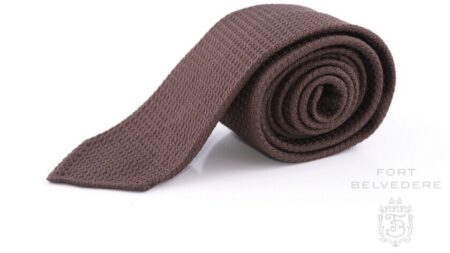
Fort Belvedere
Grenadine Silk Tie in Brown
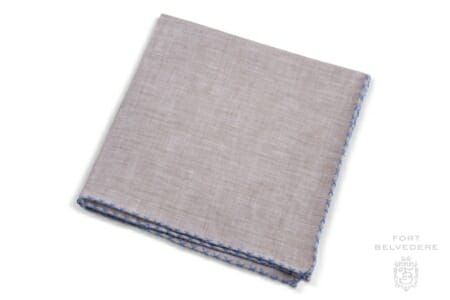
Fort Belvedere
Light Brown Linen Pocket Square with Blue Handrolled X Stitch
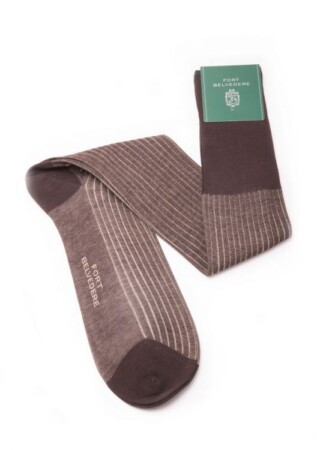
Fort Belvedere
Shadow Stripe Ribbed Socks Dark Brown and Beige Fil d'Ecosse Cotton
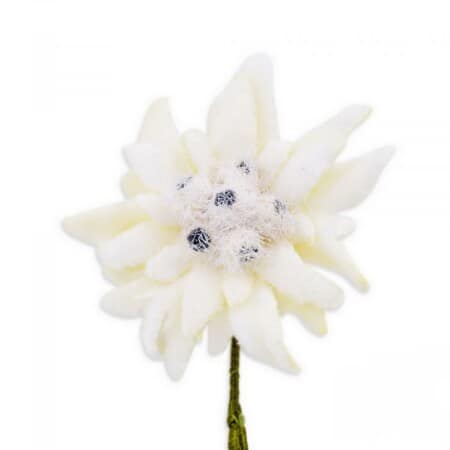
Fort Belvedere
Edelweiss Boutonniere Buttonhole Flower
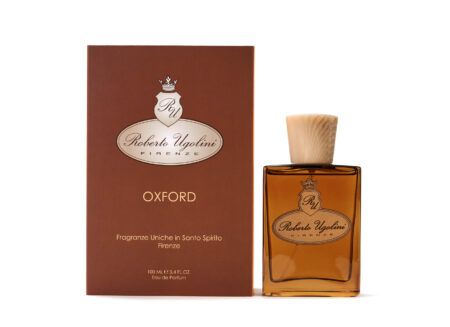
Fort Belvedere
Roberto Ugolini – Oxford
Today, the central element is, of course, the Stetson Whippet hat, which I’ve already mentioned is rabbit fur felt, size 7, and in their signature mink color. To go along with it, I’ve elected to wear one of the suits in my collection in a dark brown color and single-breasted, featuring a fine pinstripe in tan and blue.
I’m also wearing an off-white shirt from Charles Tyrwhitt, which features French cuffs and into those I have inserted a pair of vintage cufflinks in multiple metal tones, both gold and silverish.
My wool tie is in a tan shade to continue the color feel, and my vintage pocket square is in a light tan and light blue to go along with the thin pinstripes in the suit.
My shoes are dark brown Adelaide-style Oxfords from the Swedish brand Skolyx, and I’ve finished up the outfit with two accessories from Fort Belvedere today. These would be my two-tone, shadow-striped socks in dark brown and beige, and my Edelweiss boutonniere to pick up on the off-white and blue tones.
In the fragrance department, I’ve gone for Oxford from the Roberto Ugolini collection because the bold scent goes well with the bold feel of Stetson hats. I’m wearing Oxfords and the color of the bottle also harmonizes with my outfit.
To find the socks and boutonniere I’m wearing today, along with a wide array of other classic men’s accessories and fragrances from the Roberto Ugolini collection, take a look at the Fort Belvedere shop.
Stetson Hats FAQ
Does Stetson only make cowboy hats?
Stetson doesn’t only make cowboy hats. They also make caps, fedoras, and performance-based hat styles.
What kinds of hats does Stetson make?
Stetson is most well known for making western/cowboy hats, but also makes fedoras and other dress hat styles.
Does Stetson offer a wide range of sizes?
Stetson offers a pretty standard range of sizes, from 6 ¾ to 7 ¾
Do Stetson hats fit true-to-size?
Stetson hats do generally fit true-to-size,
Why are Stetson hats so expensive?
Stetson hats are so expensive because of the imported materials, elaborate machines, and labor needed to get a finished product.
What materials does Stetson use for their hats?
Stetson generally uses either rabbit or beaver fur for their hats. Some models do use wool or synthetic fabrics instead.
Are Stetson hats versatile?
Stetson hats can best be worn from the range of business casual to business formal occasions. Any outfit that synchronizes with a fedora will work here.
Can Stetson hats be a part of Classic Style?
While Western Stetson hats can push the lines between classic and Western styles, their fedora offerings are completely in line with classic style.
Did you miss our previous article...
https://manstuffnews.com/men-fashion/driving-gloves-how-the-heck-do-i-wear-these-things
 Backyard GrillingWeekend WarriorsAdvice from DadBeard GroomingTV Shows for Guys4x4 Off-Road CarsMens FashionSports NewsAncient Archeology World NewsPrivacy PolicyTerms And Conditions
Backyard GrillingWeekend WarriorsAdvice from DadBeard GroomingTV Shows for Guys4x4 Off-Road CarsMens FashionSports NewsAncient Archeology World NewsPrivacy PolicyTerms And Conditions
